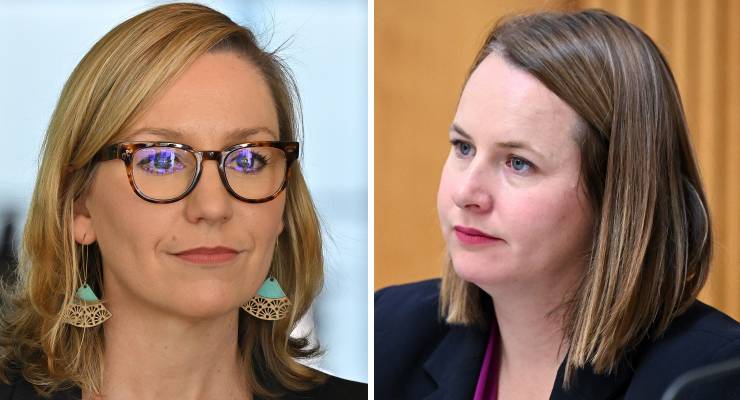
Last week, the Senate inquiry into current and proposed sexual consent laws in Australia convened three days of public hearings. “I’m just absolutely appalled by what I’ve heard, and I think people need to be held accountable,” said Liberal Senator Paul Scarr, the inquiry’s chair. “There needs to be fundamental change. I’m deeply, deeply disturbed.”
Though the inquiry was officially set up to look at harmonising sexual consent laws in Australia, the hearings ultimately canvassed how we as a society prevent and respond to sexual violence more broadly, including relationships and sexuality education in schools, the funding and availability of support services and criminal justice responses.
The powerful testimony of victim-survivors and those who advocate on their behalf over the course of those three days represented a watershed moment, though not as visible (and noisy) as the historic 2021 Women’s Marches, another watershed moment. I can honestly say — as someone who has worked in women’s safety and reported on these issues as a journalist for more than two decades — that something fundamentally shifted.
Firstly, the tone of the hearings was remarkable. After recent, unedifying displays in Parliament in regard to sexual violence, it was good to see senators from across the political spectrum — Scarr, Labor Senator Nita Green and Greens Senator Larissa Waters — treat victim-survivors and sexual violence advocates with such respect, all the while demonstrating a genuine commitment to improving sexual violence prevention and responses.
Just a month ago, members of the two main political parties were trading accusations of how the other side had “weaponised” a rape allegation, endlessly whinging about how that specific allegation had affected them and their political prospects. All the while, they were referring to an alleged rape victim’s leaked — I repeat, leaked — text messages. But last week, I thought to myself: maybe our political leaders are actually capable of showing real leadership on this issue.
Here we had a group of senators working together to shine a light on sexual violence in Australia, an issue that has long been the poor cousin, so to speak, of the National Plan to Reduce Violence Against Women. Investment in sexual violence frontline response services and prevention programs has long paled in comparison to the attention — and funding — devoted to the issue of domestic violence, though sexual violence can be part of a pattern of domestic violence. Angela Lynch, the executive officer of the Queensland Sexual Assault Network, was at pains to make that point in her opening statement, highlighting sexual violence services in her state receive 13% of what the domestic violence sector does.
“This is not taking away anything from the domestic violence sector, but this comparison to our most closely aligned and affiliated sector is evidence of longstanding sector concerns that sexual violence is not being prioritised,” she said.
Lynch also highlighted that victims of sexual violence are getting younger, the acts of violence more violent, and overall incidents are increasing at an alarming rate. In Queensland, for example, official reports of rape and attempted rape have increased by 115% over nine years, and 18% just last year alone. Yet most Queensland sexual violence services have long waitlists of eight to 12 months or longer, which means victim survivors are not getting the service they need when they bravely reach out for help.
There needs to be more overall investment in women’s sexual violence response services and more visibility of the issue in the National Plan to End Violence Against Women, Lynch said.
Speaking of reaching out for help, Senator Scarr raised the fact that some victim survivors of sexual violence are deterred from seeking mental health support because their counselling notes could be accessed by the defence. “It’s an issue,” said Lynch. “The fact the courts have ‘discretion’ in this area is scary for victims.”
Then, in a prescient comment that would have particular relevance for anyone concerned about certain segments of the media’s decision to continue to run stories over the weekend based on Brittany Higgins’ leaked text messages, Lynch said: “Victim-survivors are aware that their lives become opened up in these proceedings … they can get access to telephone records as well.”
The issue of sexual violence on university campuses was another subject of focus. Campaigners on that issue have suffered from bad luck, with the Turnbull government coming very close to establishing an independent taskforce to oversee university responses to sexual violence in 2018, but then Turnbull was rolled and the new Morrison government wasn’t having a bar of it.
The senators leading the inquiry were visibly shocked by what they heard and suggested that the inquiry would throw its weight behind the renewed call from End Rape on Campus for an independent taskforce.
Those who work on the frontline of sexual violence who appeared at the hearings, many of whom have persisted in the face of powerful resistance, like Nina Funnell and Sharna Bremner from End Rape on Campus, were visibly moved to finally have their long-time calls for change heard and validated. It was quite something, really.
The inquiry is due to report back in September.
If you or someone you know is affected by sexual assault or violence, call 1800RESPECT on 1800 737 732 or visit 1800RESPECT.org.au. In an emergency, call 000.








I’m glad this is being discussed. I think education is important but I’m a bit sceptical about the implicit assumption that perpetrators don’t know what consent is. There is obviously a spectrum of understanding but no amount of education is going to change someone that disregards consent.
Allowing the defence to access the victim’s counselling notes is horrendous and goes against every concept of confidentiality. How is this able to occur, and what else are defence lawyers entitled to examine?
Well, we know the Nationals and Liberals have form in leaking information about women who make internal complaints against men.